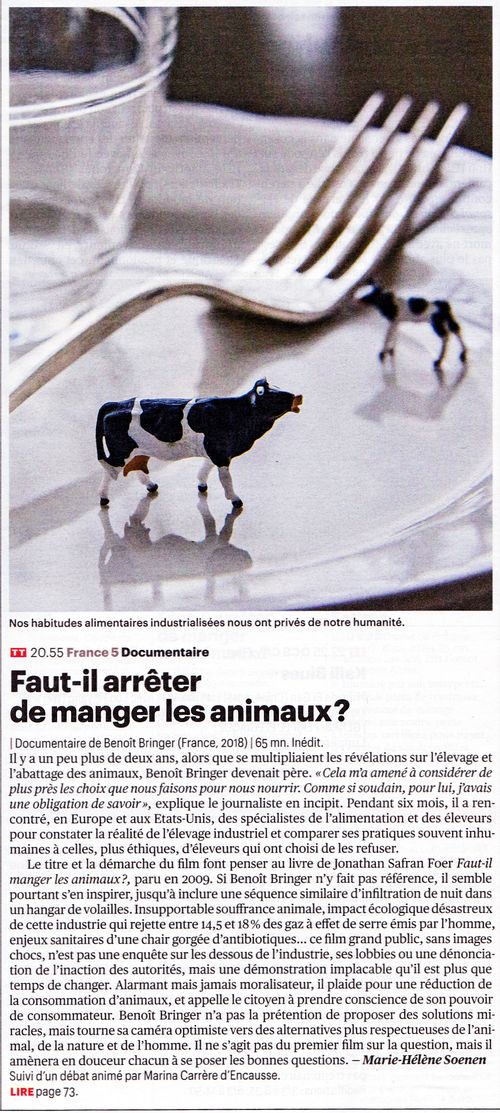
On Wednesday, February 28th 20.55 French television channel France 5 will show this programme:
Is it necessary to stop eating animals?
It will probably be shown on TV5 Monde at a later date.
A little more than two years ago, while a lot of information was given on the breeding and the slaughter of animals, Benoît Bringer became a father. “It made me to consider more closely the way we feed. As if suddenly, for him, I had an obligation of knowledge”, explains the journalist in incipit. In six months, he met, in Europe and in the United States, specialists of food and breeders to examine the reality of the cattle industry and compare its often inhuman practices to those, more ethical, of breeders who chose to refuse them. The title and the approach of the documentary remind the book by Jonathan Safran Foer Eating Animals published in 2009. If Benoît Bringer does not refer to it, he nevertheless seems to be inspired by it, including a similar sequence of night infiltration in a shed of poultry. Unbearable animal suffering, disastrous ecological impact of this industry which rejects between 14,5 and 18 % of the greenhouse gases emitted by man, the sanitary stakes in a flesh full of antibiotics…. This film for non-specialists, without shocking images, is not an investigation on the dark sides of the meat industry, its lobbies or a denunciation of the inactivity of the authorities, but a merciless demonstration that it is high time to change. Alarming but never moralizing, it pleads for a reduction of the consumption of animals, and calls citizens to become aware of their power as consumers. Benoît Bringer does not say is able to propose miracle solutions, but turns his optimistic camera to alternatives more respectful of the animals, of nature and of man. It is not the first documentary about the question, but it will help everybody to ask the good questions.
Marie-Hélène Soenen
Followed by a debate with Marina Carrère d’ Encausse.

Here in the US we have concerns about “factory farms” and there is a movement to be sure that even animals raised for meat are in good living conditions, not crammed into pens or cages.
I’m glad to read there is such a movement in the USA. On television we’ve seen pictures of HUGE farms in the USA and we are scared that we’d have such farms in France too. There has been a row about the opening of such a farm with 1,000 cows in the North of France. I’m not sure another could open in the near future.
Most breeders still believe that farms are simply factories designed to PRODUCE beef, veal, pork, poultry, lamb, etc. They complain they are not getting a decent income for the time they work – which is absolutely true. And they hate people who make their difficulties greater by caring for animals.
But there are successful farmers today, those who work on small farms, growing organic food, raising animals in the best possible conditions. They don’t need to sell their production in supermakets because their “clients” come to their farms and buy vegetables and meat. “Clients” can see how animals are raised!
Goodness a thousand cows… Wish we could turn the clock back to that. The cats must eat meat but, in truth, no matter the packaging they are getting a lot of things people do not eat so it is a use of byproduct. Dad has cut back and is now learning tofu. Not bad that
Purrs friends
We eat as little meat as we can. But we live in Savoy and it is very difficult to do without (a lot of) cheese! And cheese is meat, actually.
Tofu… well… I find it difficult to adapt recipes “normally” with meat and using tofu instead. I tend to cook mainly poasta, rice, polenta. But with… cheese! I have a relative who produces organic lentils, and we eat lentils with onion nearly once a week.
This blog (in English) should be of interest for you :
https://green-me-up.com/?lang=en